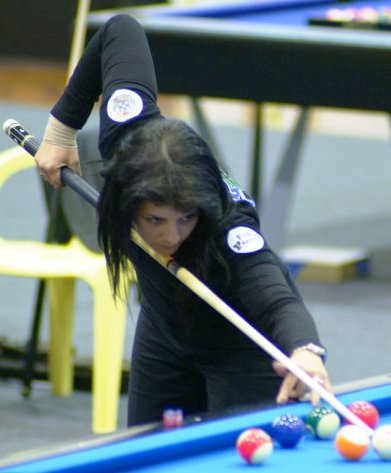The governing bodies of pool are facing a potential lawsuit for sex discrimination. This is being brought forward by female players who are upset about the lack of rules regarding transgender competitors.
Lynne Pinches, a player who recently chose not to participate in the final of a national championship because her opponent was a transgender woman, is one of 30 players fundraising for their case.
Last month, the players were disappointed when the restrictions were revised. They believed that they had been assured that transgender women or non-binary players would be prevented from competing against females. However, the World Eightball Pool Federation and Ultimate Pool Group announced in new guidelines that “transgender and non-binary players will be able to participate in the women’s series”.
The players have announced their intention to challenge this legally. They argue that women are choosing not to participate in women’s pool matches, including tournament finals, because they feel the competitions are not fair. They claim that players who are biologically male but identify as women are being allowed to win trophies and prize money in women’s competitions. This group of female players is now planning to take the organizers to court for sex discrimination.
The players argue that pool is a game affected by gender. They point out that the initial break, which relies on upper body strength, is a significant factor in determining the outcome of a match. A powerful break makes it much easier to pot balls and clear the table. Other factors such as hand size and strength to make a ‘bridge’ that supports the cue, and height and reach at the table, also matter. They also highlight the social factors, as pool halls and pub snooker tables continue to be male-dominated. They believe that these reasons justify the need for women to have their own events.
The group has launched a fundraising appeal and has already raised more than £5,000 within hours of its launch. They estimate that they need £30,000 to launch an Equality Act challenge against pool’s governing bodies.
The players argue that allowing biologically born males in women’s competitions requires women to compete against men. They believe that the inherent advantages that all males have because of their sex puts women at a clear disadvantage when they compete against them. They argue that the advantages of being biologically male limit women’s ability to qualify and succeed in these competitions. They believe that the inclusion of biologically born male competitors in women’s sport is discriminatory to women on the grounds of their sex. They point out that the Equality Act 2010 specifically allows sport to be segregated on the basis of sex, regardless of gender reassignment, and states that it is not unlawfully discriminatory to do so.
Pinches has previously expressed her disappointment at a “U-turn” in international rules and has declined an invitation to turn full-time professional. She says the support for the players since has been “absolutely amazing”.
The players plan to write to the organizing bodies of pool and ask them to reinstate the policy they introduced in August 2023, but withdrew in October, of removing biologically born males from women-only competition. If this is unsuccessful, they plan to litigate on the basis of sex discrimination, to generate a judgment that it is unlawful to permit biologically born males into women’s sport.
Other players involved in the action include Frankie Rogers, who has said: “Bringing this case is the only option we have. We don’t want to be forced to play biologically born male players who have clear advantages.”





